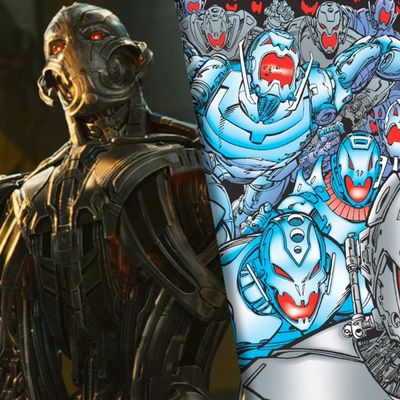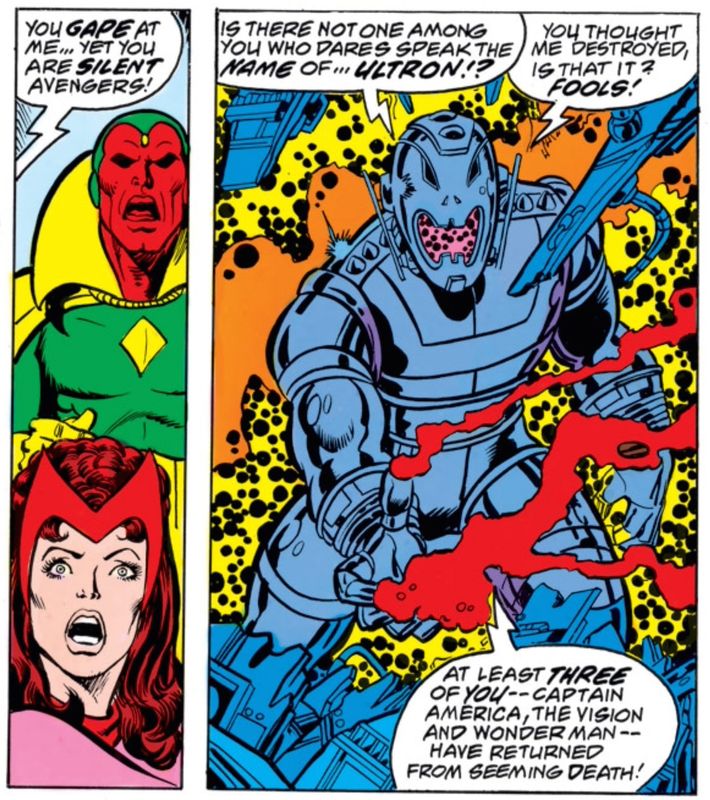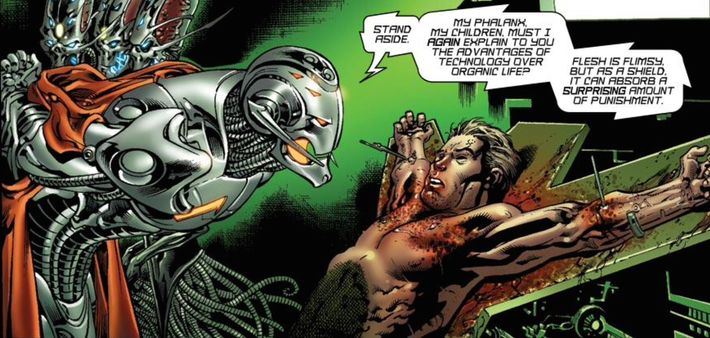
Ever since July 2013, when Marvel Studios announced that its next Avengers movie would be entitled Age of Ultron, entertainment writers and comic-book retailers have cranked out lists of the best comics story lines about the titular evil robot. But any best-Ultron-stories list is a bit of an oxymoron. Reviewers of Avengers: Age of Ultron have repeatedly noted that Ultron’s big-screen incarnation is confusing and dull, and they’re right — but that’s not because the filmmakers lost sight of the character’s roots. Put simply: Ultron has always been boring. At his archetypal core, he is wholly underwhelming. If anything interesting happens in an Ultron tale (this weekend’s megablockbuster very much included), it’s never because of him.
[Warning: Very minor Age of Ultron spoilers ahead.]
This has been true from the very beginning, when the sinister android debuted in the pages of Avengers in 1968. He attacked the Avengers for no particularly interesting reason — he just wanted to defeat them and take over New York City because he felt like it. His dialogue was about as boilerplate as you could imagine: stuff like, “You shall be the first human felled by the hand of — Ultron-5, the Living Automaton!” and, “You may have eluded me this time, Avengers … but, there are other ways of striking at you … more deadly ways!” Snore. Honestly, the only memorable thing about Ultron’s debut was artist John Buscema’s admittedly very creepy character design — especially the robot’s face, permanently locked in an expression like that of a grinning, metallic jack-o’-lantern.

Things went from dumb to cringeworthy when writer Roy Thomas brought Ultron back a few issues later. To exact his revenge, Ultron built the superpowered android Vision and sent him to kill the Avengers — a mission the sensitive Vision quickly rejected. But Thomas wrote Ultron to have a backstory that was real unique in the annals of supervillain history: He gave him daddy issues. We found out that longtime Avenger Hank Pym (a.k.a. Ant-Man and, later, Giant-Man) had built Ultron as an experiment in artificial intelligence. We get a supremely weird flashback: Apparently, when Ultron was first activated, he started talking to Pym. First, the robot skrawked out, “Da-da … want Da-da”; then, “No need to plug me in Daddy … I’m alive … just like you …”; then, while firing a laser beam at Pym, “Hold still, Dad … don’t you know I want … to play with you?”
The flashback then includes one of the least-subtle pieces of writing ever committed to a comics page. While recovering from his creation’s attack, Pym has the following internal monologue:
It’s … unbelievable! In seconds, that robot’s called me everything from Da-da to Father … changed in speech patterns from infancy through adult-hood! And now, it wants to kill its imagined parent! It’s like a living, mechanized Oedipus Complex!
That last bit of on-the-nose analysis has, unfortunately, defined Ultron ever since, to the point that Ultron is the only major supervillain who’s into incest. A bunch of his story lines involve the android antagonist trying to kill his fleshy dad and bang his fleshy mom. Writer Jim Shooter wrote an infamous tale called The Bride of Ultron back in 1977, wherein Ultron decided he needed a metallic mate. So he builds a robot with boobs and tries to make her a neural clone of a specific human woman: Hank Pym’s wife, Janet. Ultron, remember, thinks of Hank as his “father.” So Ultron is building a sexy clone of his mother. In another stroke of awe-inspiring non-subtlety, Shooter chose to have Ultron name his incestuous mommy-wife “Jocasta.” Ew.
Beyond that Freudian quirk, there’s nothing interesting about Ultron. All his schemes are generic robot-who-wants-to-destroy-humanity stuff. For 47 years, we’ve had to endure story after story where Ultron shows up, has some vaguely defined technological plot to take over the world, and is defeated by an implausible counterattack (often involving the power of human empathy or some other bit of narrative Luddism). His methods of attack are always yawn-worthy: Maybe he takes over Iron Man’s armor, or maybe he “hacks into” the S.H.I.E.L.D. mainframe, or maybe he leads a massive army of soulless robots. His dialogue is always about as generic as dialogue can get for a megalomaniacal robot: things like, “Iron-bound idiot! No amount of force can damage my body, built of pure, indestructible adamantium!” or, “You cannot guess the satisfaction it gives me to see you this way … frozen into immobility by the sheer force of my computerized will!” or, “Hear me, nations of the world! … Slorenia [a made-up European country Ultron had just taken over] … will soon take its place as a cradle of a new race — and birthplace of my new world!”
That last overwrought boast brings up another point: What, exactly, is Ultron’s overarching goal? It’s never been firmly established. Other recurring comics villains have pretty clearly defined motivations: Magneto believes mutants are a persecuted minority that need to rise up against their oppressors, Joker wants to torment Batman through wanton chaos, Loki wants to prove he’s better than his brother Thor, and so on. But does Ultron want to eliminate humanity? Subjugate us? Force us to evolve? This lack of clear archetypal structure infects Age of Ultron, too. The movie version of Ultron was programmed to defend humanity, so he … uh … decides to drop a meteor on us? Because it’ll force the survivors to … be better humans? But he also wants to build a fleshy machine hybrid body for himself? Writers have never been able to come to a consensus on Ultron’s shtick, meaning he’s become a muddy soup of derivative man-versus-machine stock plots.

All of this is not to say there haven’t been interesting stories with Ultron in them. For example, the 2007 comics story line that introduced the modern incarnation of the Guardians of the Galaxy featured the nascent team fighting Ultron in outer space, and without that story, we’d never have the delightful dynamics of Rocket, Groot, and Peter Quill. The 1999 “Ultron Unlimited” story line pitted the Avengers against the impossible odds of a self-replicating Ultron army, which made for a thrilling depiction of our heroes as a ragged band of exhausted and outnumbered resistance fighters. This year’s “Rage of Ultron” comic had gorgeous artwork and some fun dialogue. And, of course, Avengers: Age of Ultron is a thrilling superhero romp with much to recommend it. But the Ultron scenes are, on average, the dullest and most befuddling portions of the flick. Even James Spader’s sexy BDSM voice can’t quite make the bad robot into a villain on the level of Ian McKellen’s Magneto, Heath Ledger’s Joker, and the like.
But despite all this, there’s something to be said for a vague threat like Ultron. In many of the superhero tales where he plays antagonist, he can become the narrative equivalent of tofu: He has no unique taste of his own, but can fill out a story without taking attention away from the flavor of the protagonists. He’s just dangerous enough (especially as the years have worn on and techno threats have become more viscerally frightening for readers and viewers) to make a story’s heroes plausibly outgunned — and thus forced to improvise, reconcile their differences, and/or overcome their anger at the robot’s creator (Pym in the comics, Tony Stark in the movie). But Ultron’s also just boring enough to ensure that a talented writer doesn’t have to waste much page space or screen time on him and his motivations. And hey, without Ultron, we wouldn’t have Vision — and as anyone who has seen Age of Ultron can attest, we’re lucky to have Paul Bettany’s mellifluous tones and magnificent face in the future of Marvel’s never-ending megahit franchise.




